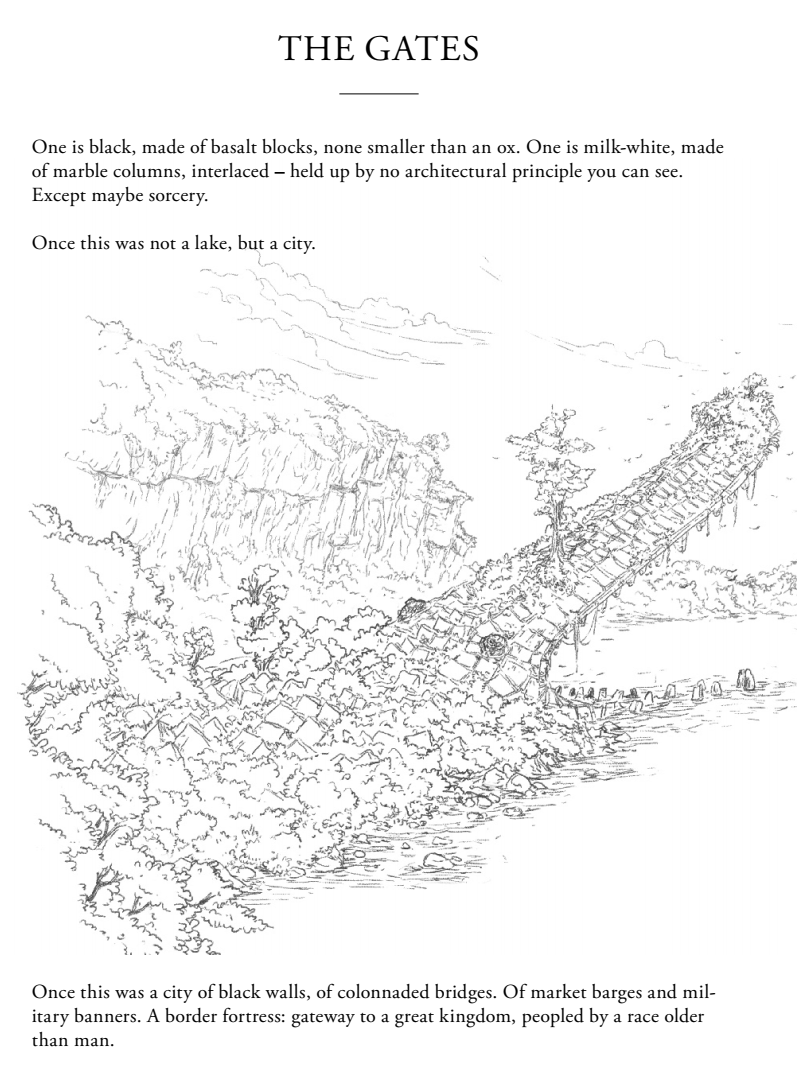Thousand Thousand Islands Zine Structure
An Unconventional Review of the First Two Issues

Rather than tell you why Zedeck Siew and Munkao’s zine is good and why, I’m going to focus on describing how the books are structured. I think that reveals quite a lot of what makes them work. Before I do that, I’m going to quickly describe their other significant qualities.
- They do not contain stats or any system-specific information. You’ll need to supply that yourself.
- The art is fantastically illustrative in such a way that it is actual content to help you interpret the text.
- The writing is terse and poetic, intended to make you think beyond what you’ve read. This should inspire you to make gameable decisions about the npcs and world.
- The books aren’t quite as organized as implied below.
In short, you’re going to need to want to do a lot of prep yourself (maps and stats and such) or you’re going to want to play by the seat of your pants in some weird abstract manner that isn’t very much like B/X D&D.
General Rules of Writing Inferred from the Zine
- Every detail of the particular must also convey settlement/cultural/etc information.
- Descriptions should include information that suggests something game-able.
- Where possible, use sentence fragments to reduce word count in order to allow information to be gleaned at a glance.
- Sometimes include vague information that the referee will have to determine the true meaning of. (Example: “Anything from the forest is touched by its spirits. That scent never really rubs off, no matter how far you go.")
- Include ways that the settlement may be entered and exited and how passage might be prevented.
[Book title is a partial name of settlement]
[book subtitle is a nickname that hints at what characterizes the settlement]
[number of days travel to settlement], [mode of travel (foot, river, direction)]
[Description of approach that characterizes settlement in about two lines.]
[Imposing landmark visible upon entry]
[Short-short mythological story about the landmark that tells the origin of the settlement.] One a5 page’s worth of words. This is the background information that the referee may not need to pass on but that will inform the referee’s interpretation of the rest of this book.
[Full Name of settlement]
[Type of settlement] (example: port or town) [Description of whatever is typical here with notes about why these things are typical or details about the things.] (Example: “Houses are wood and palm. These are the only kind permitted. Stone buildings were follies of a previous age, better left to ruin and the forest.")
[Type of] goods of [settlement]
List of low-magic curios or food.
Customs of [settlement]
[Custom]
[what’s the norm?]
[what if it’s broken?]
Personalities in [settlement]
[Characterize briefly but evocatively.]
[Describe what this person does. Include an action that conveys a larger aspect of their personality. (Example: “She leaves with crafts, forest goods, and the odd adventurous youth.")]
[[adventure hook] (Example: Baby who is actually an accountant spirit in a birdcage was stolen by a cat.)]
OR
[Provide details that may lead to sandbox content but do not provide a specific hook. (Example: “The last two babies she delivered were born with antennae. A bad sign. A forest witch is messing with people.")]
The [ruler type] of [settlement]
[Description of role in society/religion]
[settlement god]
[Fable about the god to characterize.]
[Another fable about the god appears later.]
[Building]
[scene outside]
[scene inside]
[Person inside]
[same as other personalities]
[citizen/creature/monster/spirit/idol] of [settlement]
[describe what they are]
[Describe how one is encountered]
[random tables to determine appearance, smell, sound, special ability, occupation, current behavior, etc]
Encounters in [nearby wilderness]
Description of wilderness in two lines.
As you [travel in a particular way] you see: 2d6 encounter table. Doubles add a second special encounter which is described after the table.
[Faction building] of the [flavorful name that corresponds to the god]
Describe those who live/serve here.